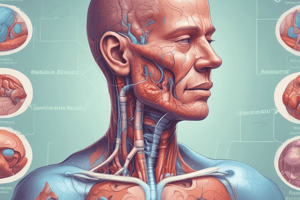Podcast
Questions and Answers
What condition leads to the accumulation of blood in the pulmonary veins?
What condition leads to the accumulation of blood in the pulmonary veins?
- Pulmonary embolism
- Right sided heart failure
- Coronary artery disease
- Left sided heart failure (correct)
What is a common symptom associated with menopausal flush?
What is a common symptom associated with menopausal flush?
- Joint pain
- Cold sweats
- Mood swings
- Hot flashes (correct)
Which of the following is not a cause of blood accumulation in the pulmonary veins?
Which of the following is not a cause of blood accumulation in the pulmonary veins?
- Heart arrhythmia
- Mitral valve stenosis
- Chronic lung disease (correct)
- Left sided heart failure
Menopausal flush is primarily triggered by which physiological change?
Menopausal flush is primarily triggered by which physiological change?
Which of the following conditions is directly associated with left sided heart failure?
Which of the following conditions is directly associated with left sided heart failure?
What is the definition of hemorrhage?
What is the definition of hemorrhage?
Which of the following is NOT a cause of hemorrhage?
Which of the following is NOT a cause of hemorrhage?
Which type of blood vessel rupture is associated with arterial hemorrhage?
Which type of blood vessel rupture is associated with arterial hemorrhage?
Which condition is related to capillary rupture bleeding?
Which condition is related to capillary rupture bleeding?
Which of the following correctly represents primary causes of hemorrhage?
Which of the following correctly represents primary causes of hemorrhage?
What is a primary cause of cardiogenic shock?
What is a primary cause of cardiogenic shock?
Which condition is NOT typically associated with cardiogenic shock?
Which condition is NOT typically associated with cardiogenic shock?
What bacterial influence is mentioned as a cause of decreased cardiac output?
What bacterial influence is mentioned as a cause of decreased cardiac output?
Which of the following scenarios could lead to cardiogenic shock?
Which of the following scenarios could lead to cardiogenic shock?
In the context of cardiogenic shock, what does COP refer to?
In the context of cardiogenic shock, what does COP refer to?
What does the symbol '&' typically represent in programming?
What does the symbol '&' typically represent in programming?
What might '08' refer to in a coding context?
What might '08' refer to in a coding context?
What might the series of dashes and periods signify in a code snippet?
What might the series of dashes and periods signify in a code snippet?
What is a common result of tissue injury in shock?
What is a common result of tissue injury in shock?
How could '88' be interpreted in a data structure?
How could '88' be interpreted in a data structure?
What does the repeated use of '&' and '0' suggest in this context?
What does the repeated use of '&' and '0' suggest in this context?
Which system failure is associated with pooling of blood during shock?
Which system failure is associated with pooling of blood during shock?
What irreversible condition may occur as a result of kidney failure in shock?
What irreversible condition may occur as a result of kidney failure in shock?
What does the term 'anuria' in relation to shock indicate?
What does the term 'anuria' in relation to shock indicate?
What is an effect of shock on the brain?
What is an effect of shock on the brain?
Flashcards are hidden until you start studying
Study Notes
Hemorrhage
- Defined as escape of blood outside the cardiovascular system (CVS).
- Causes include:
- Arterial/Venous Rupture: Often due to trauma, atherosclerosis, or aneurysms.
- Capillary Rupture: Linked to chronic venous congestion and hemorrhagic diathesis.
- Blood can accumulate in pulmonary veins, commonly due to left-sided heart failure.
Cardiogenic Shock
- Results from decreased cardiac output (COP).
- May arise from:
- Septicemia: Bacterial infection leading to toxin release.
- Cardiac Diseases: Various cardiac conditions impairing function.
- Pulmonary Embolism: Blood clots blocking pulmonary arteries.
Pathophysiology
- Shock leads to blood pooling, ineffective circulation, and insufficient oxygen delivery.
- Sympathetic nervous system failure along with Renin-Angiotensin-Aldosterone System (RAAS) malfunction can exacerbate the condition.
Consequences of Shock
- Tissue Injury: Ischemia leading to cell necrosis.
- Organ Damage:
- Kidney: Can result in irreversible anuria and renal failure (RF).
- Brain: Severe cases may lead to coma.
Clinical Manifestation and Stages
- Understanding the clinical manifestations and progression stages of shock is crucial for diagnosis and management.
Studying That Suits You
Use AI to generate personalized quizzes and flashcards to suit your learning preferences.



